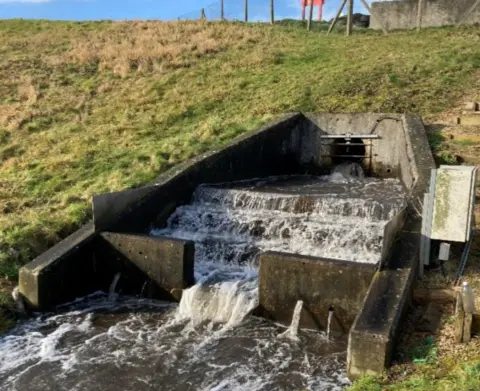BBC News, East Midlands
 Getty Images
Getty ImagesEast Midlands Airport has been fined almost £900,000 for polluting a nearby brook with de-icer.
The airport, which cannot connect to a mains sewer and so is responsible for the run-off from its runways, pleaded guilty to three discharges of contaminated water into Diseworth Brook between 14 January and 4 February 2022.
Airport managing director Steve Griffiths apologised, and said it had taken “decisive action” and invested more than £10m in its drainage.
But sentencing the airport at Derby Crown Court on Monday, Judge Martin Hurst said it had failed to properly invest in its systems from 2015 onwards, and said the money being spent “should reasonably have been spent then”.
He handed the airport – which he said was the second biggest freight airport in the UK and 14th largest in terms of passengers – a fine of £892,500 and costs of £65,687.54, as well as a victim surcharge.
The judge said the airport had been “reckless” and caused “risk to livestock and the residents of the village of Diseworth”.
Sewage fungus
The court heard the systems to process water contaminated by de-icer – to be released into both the River Trent and Diseworth Brook – were installed in the year 2000, with a “useful service life” of 20 years.
Run-off from the essential de-icing, including of runways and aircraft, is held in a series of winter and summer ponds, which let water out at different times of the year, and hold different levels of contamination.
The court was told Environment Agency investigations had found defects throughout their systems, including with monitors, pumps and pond liners.
It led, on three occasions, to Diseworth Brook – which runs “straight through the middle of the village” – being polluted.
Levels of up to eight times the level allowed were detected on one occasion, the court heard.
This pollution causes outbreaks of sewage fungus, damaging water quality and harming plant life.
 Environment Agency
Environment AgencyThe Environment Agency said the airport’s environmental permit allows a discharge of site drainage containing a maximum level of biochemical oxygen demand (BOD) of 15 mg/l of water.
BOD is a measure of the amount of oxygen consumed by aerobic microorganisms to decompose organic matter in a water sample and is indicative of the level of organic pollution, the agency added.
The agency said the airport had a “poor history” of permit compliance with 13 separate breaches since 2006 – resulting in 10 written warnings.
Sentencing, the judge said the airport’s investment of more than £10m in the systems since the breaches showed it had been responsible and taken action, albeit “five years too late”.
‘Serious offence’
Following the hearing, Mr Griffiths said: “I’d like to say sorry for the three breaches that we had in early 2022, where we discharged water beyond our permit into the local watercourses.
“We took decisive action at that point in time and we controlled those issues and that was ahead of any prosecution taking place.”
Ian Firkins, senior environment officer for the Environment Agency’s East Midlands area, added: “We welcome this sentence which should act as a deterrent to other companies who flout environmental legislation.
“The conditions of an environmental permit are designed to protect people and the environment.
“Failure to comply with these legal requirements is a serious offence that can damage the environment.”




